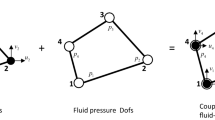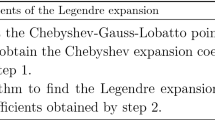Abstract
A novel second order family of explicit stabilized Runge–Kutta–Chebyshev methods for advection–diffusion–reaction equations is introduced. The new methods outperform existing schemes for relatively high Peclet number due to their favorable stability properties and explicitly available coefficients. The construction of the new schemes is based on stabilization using second kind Chebyshev polynomials first used in the construction of the stochastic integrator SK-ROCK. An adaptive algorithm to implement the new scheme is proposed. This algorithm is able to automatically select the suitable step size, number of stages, and damping parameter at each integration step. Numerical experiments that illustrate the efficiency of the new algorithm are presented.







Similar content being viewed by others
Notes
Indeed, up to order two, the order conditions for nonlinear problems are the same as the order conditions for linear problems [14, Chap. III].
References
Abdulle, A.: Chebyshev methods based on orthogonal polynomials. PhD Thesis, University of Geneva, Department of Mathematics. University of Geneva, (2001)
Abdulle, A.: Fourth order Chebyshev methods with recurrence relation. SIAM J. Sci. Comput. 23(6), 2041–2054 (2002)
Abdulle, A.: ROCK2 and ROCK4: software for stiff differential equations (discretized parabolic problems). Codes available under http://anmc.epfl.ch/, 2(002)
Abdulle, A.: Explicit Stabilized Runge–Kutta Methods, pages 460–468. Encyclopedia of Applied and Computational Mathematics, Springer Berlin Heidelberg, (2015)
Abdulle, A., Almuslimani, I., Vilmart, G.: Optimal explicit stabilized integrator of weak order 1 for stiff and ergodic stochastic differential equations. SIAM/ASA J. Uncertain. Quantif. 6(2), 937–964 (2018)
Abdulle, A., de Souza, G.R.: Explicit stabilized multirate method for stiff stochastic differential equations. arXiv:2010.15193, (2020)
Abdulle, A., Li, T.: S-ROCK methods for stiff Ito SDEs. Commun. Math. Sci. 6(4), 845–868 (2008)
Abdulle, A., Medovikov, A.: Second order chebyshev methods based on orthogonal polynomials. Numer. Math. 90(1), 1–18 (2001)
Abdulle, A., Vilmart, G.: PIROCK: a swiss-knife partitioned implicit-explicit orthogonal Runge-Kutta Chebyshev integrator for stiff diffusion-advection-reaction problems with or without noise. J. Comput. Phys. 242, 869–888 (2013)
Abdulle, A., Vilmart, G., Zygalakis, K.C.: Weak second order explicit stabilized methods for stiff stochastic differential equations. SIAM J. Sci. Comput. 35(4), A1792–A1814 (2013)
Almuslimani, I.: Explicit Stabilized Methods for Stiff Stochastic Differential Equations and Stiff Optimal Control Problems. University of Geneva. PhD thesis, (2020)
Almuslimani, I., Vilmart, G.: Explicit stabilized integrators for stiff optimal control problems. SIAM J. Sci. Comput. 43(2), A721–A743 (2021)
Bakker, M., Analytical aspects of a minimax problem.: Technical Note TN 62 (in Dutch). Mathematical centre, Amsterdam (1971)
Hairer, E., Lubich, C., Wanner, G.: Geometric numerical integration, volume 31 of Springer Series in Computational Mathematics. Springer-Verlag, Berlin, second edition, 2006. Structure-preserving algorithms for ordinary differential equations
Hairer, E., Nørsett, S., Wanner, G.: Solving Ordinary Differential Equations I. Nonstiff Problems, volume 8. Springer Verlag Series in Comput. Math., Berlin, (1993)
Hairer, E., Wanner, G.: Solving ordinary differential equations II. Stiff and differential-algebraic problems. Springer-Verlag, Berlin and Heidelberg (1996)
Hundsdorfer, W., Verwer, J.: Numerical solution of time-dependent advection-diffusion-reaction equations. Springer Series in Computational Mathematics, vol. 33. Springer-Verlag, Berlin (2003)
Jeltsch, R., Torrilhon, M.: Flexible stability domains for explicit Runge-Kutta methods. In Some topics in industrial and applied mathematics, volume 8 of Ser. Contemp. Appl. Math. CAM, pages 152–180. Higher Ed. Press, Beijing, (2007)
Ketcheson, D.I., Ahmadia, A.J.: Optimal stability polynomials for numerical integration of initial value problems. Commun. Appl. Math. Comput. Sci. 7(2), 247–271 (2012)
Sommeijer, B., Shampine, L., Verwer, J.: RKC: an explicit solver for parabolic PDEs. J. Comput. Appl. Math. 88, 316–326 (1998)
Sommeijer, B.P., Verwer, J.G.: A performance evaluation of a class of Runge-Kutta-Chebyshev methods for solving semidiscrete parabolic differential equations. Afdeling Numerieke Wiskunde [Department of Numerical Mathematics], 91. Mathematisch Centrum, Amsterdam, (1980)
Tang, X., Xiao, A.: Improved runge-kutta-chebyshev methods. Math. Comput. Simul. 174, 59–75 (2020)
Torrilhon, M., Jeltsch, R.: Essentially optimal explicit Runge-Kutta methods with application to hyperbolic-parabolic equations. Numer. Math. 106(2), 303–334 (2007)
Van der Houwen, P., Sommeijer, B.: On the internal stage runge-kutta methods for largem-values. Z. Angew. Math. Mech. 60, 479–485 (1980)
van der Houwen, P.J., Sommeijer, B.P.: On the internal stability of explicit, \(m\)-stage Runge-Kutta methods for large \(m\)-values. Z. Angew. Math. Mech. 60(10), 479–485 (1980)
Verwer, J., Hundsdorfer, W., Sommeijer, B.: Convergence properties of the runge-kutta-chebyshev method. Numer. Math. 57, 157–178 (1990)
Verwer, J.G., Sommeijer, B.P.: An implicit-explicit Runge-Kutta-Chebyshev scheme for diffusion-reaction equations. SIAM J. Sci. Comput. 25(5), 1824–1835 (2004)
Verwer, J.G., Sommeijer, B.P., Hundsdorfer, W.: RKC time-stepping for advection-diffusion-reaction problems. J. Comput. Phys. 201(1), 61–79 (2004)
Zbinden, C.J.: Partitioned Runge-Kutta-Chebyshev methods for diffusion-advection-reaction problems. SIAM J. Sci. Comput. 33(4), 1707–1725 (2011)
Acknowledgements
The author is grateful to Gilles Vilmart for helpful discussions and comments.
Author information
Authors and Affiliations
Corresponding author
Additional information
Communicated by Christian Lubich.
Publisher's Note
Springer Nature remains neutral with regard to jurisdictional claims in published maps and institutional affiliations.
This work is supported by the Swiss National Science Foundation, project No: P2GEP2_195212.
Appendix
Appendix
1.1 Damping and number of stages for some choices of Peclet number
One can get more tables and increase the adaptivity of the algorithm with respect to damping. This will for sure increase the performance of the method. However, the method performs already very well with the tables we provide here.
Rights and permissions
Springer Nature or its licensor (e.g. a society or other partner) holds exclusive rights to this article under a publishing agreement with the author(s) or other rightsholder(s); author self-archiving of the accepted manuscript version of this article is solely governed by the terms of such publishing agreement and applicable law.
About this article
Cite this article
Almuslimani, I. A fully adaptive explicit stabilized integrator for advection–diffusion–reaction problems. Bit Numer Math 63, 3 (2023). https://doi.org/10.1007/s10543-023-00945-3
Received:
Accepted:
Published:
DOI: https://doi.org/10.1007/s10543-023-00945-3
Keywords
- Advection–diffusion–reaction equations
- Explicit stabilized methods
- Runge–Kutta–Chebyshev methods
- RKC
- SK-ROCK
- ARKC




